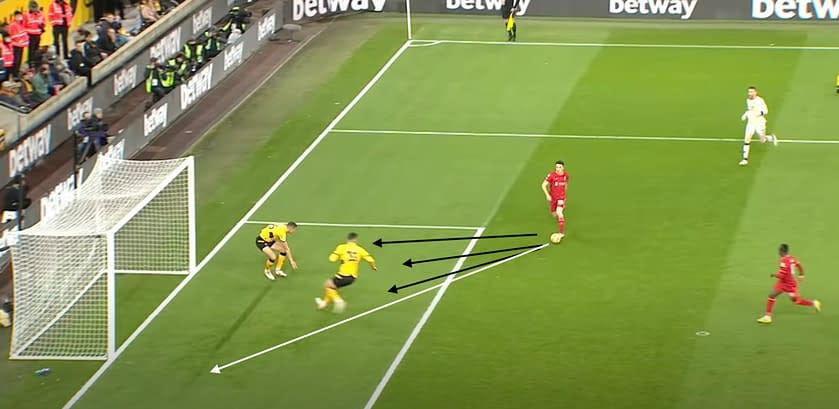What follows is about a quarter of the article I’ve just published for TTT subscribers, which can be accessed here.
Anatomy of Jota’s Misunderstood Miss Against Wolves (Excerpt)
While it was obviously a very good chance, I continue to argue that, having now watched it many times, Diogo Jota did not miss an open goal or even a “simple chance” against his old club last weekend, given that there were two defenders on the line, but who also, before getting onto the line, almost perfectly blocked potential early shooting angles, as I will show.
…
I often point out that what people often describe as the worst misses are usually from crosses coming from the wing, across the body. The worst miss of my life was on the goal-line. As a two-footed player, I found myself caught in a moment of confusion as to which one to use as the ball zipped towards me, and bamboozled, it ended up going through my legs. I couldn’t sort my feet out.
That’s often the problem: deciding which foot or part of the body to go with, and then not getting too much or too little contact with a moving ball. You’d probably score them more often than not, but you’ll also miss more than people expect, especially if you take your eye off the ball due to opponents closing in.
If you have the ball under control, as Jota did, it’s usually easier. But this was such an unusual scenario.
The situation reminded me of the concept of chunking, as used in all walks of life but is observable in chess (albeit I only know about it via research, and not from playing the game).
“A chunk in chess is a unit of information in long-term memory containing a meaningful grouping of some of the chess pieces on squares that appear on a chessboard, plus associated moves and ideas. It is a patterned cluster of chess pieces. The action of chunking is the grouping together of chess pieces.”
In other words, chess players remember familiar situations, and then don’t have to analyse individual pieces. The information is chunked together, as a way to simplify complex information, as we can only store a limited amount of data in our brains at any one time.
Yet when a chessboard is set up randomly by someone with no chess knowledge, an expert will not be able to “chunk”, as the pattern will not be recognisable. Just as we recognise the word chunking, and could recall the letters in order due to the familiarity the patterns of the language and repeated usage, we wouldn’t have the same response to zgyeeixa.
So to me, the Jota miss was about an unfamiliar situation, with no easy recall, and no clear understanding of the other variables.
As a finisher, you have to adapt and improvise, but you generally know what to expect, often in a situation that is either/or (great album by the way) – tackle will come in, or it won’t; defender will move left, or move right; goalkeeper will stand tall, or dive at my feet. There may be a third option: move left, move right, or stand still.
…
5 All angles blocked
Once in this situation, there is literally no chance of scoring with a low shot that doesn’t risk being blocked. All angles appear to be covered. To shoot past Kilman would be to put it wide, while Coady blocks the near post.




